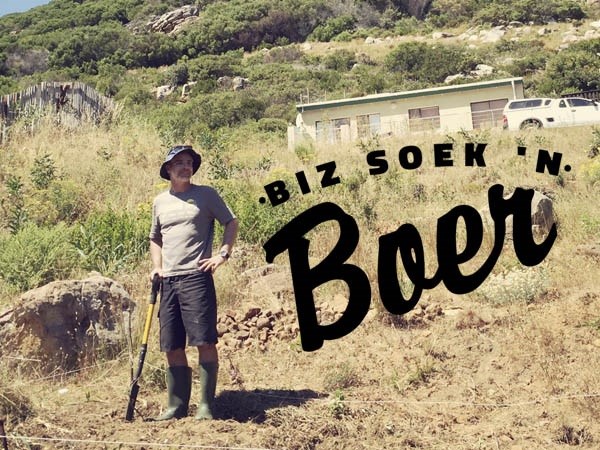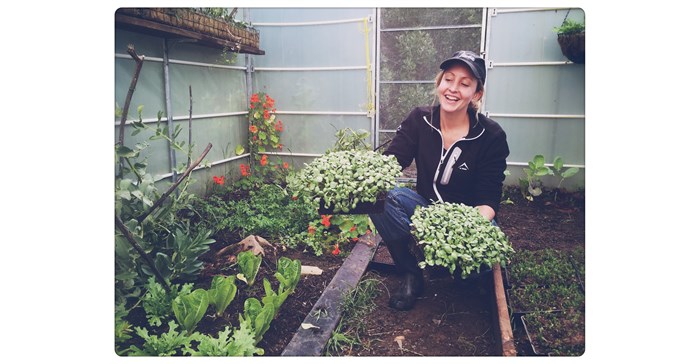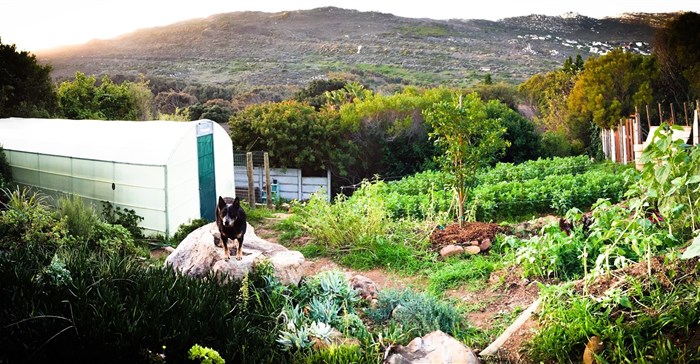"At the time a friend opened a restaurant in Kalk Bay, The Courtyard Café, and we suggested growing organic salad leaves for her. Soon after that, we were told the Foodbarn Restaurant in Noordhoek uses micro greens and we approached Chef Franck Dangereux and suggested supplying him with locally-grown produce. A few months later I bought a property in Glencairn and we started the farm on land we eventually plan to live on," says Van der Spuy.

Pierre van der Spuy: The urban farm is situated on a residential plot in Glencairn, Cape Town. The entire plot is 650sqm, but we use about a third of the property for cultivating crops and creating sustainable soil. We have two greenhouses in which we grow microgreens.
Van der Spuy: Sunflower microgreens are our main produce. We have also grown other micro greens such as beetroot, green pea, mustard, and mizuna, but found that sunflowers have the best shelf life. They last about a week in the fridge. Other produce grown inside are strawberries, kale, fennel, green peas, chilies, parsley, and salads. Outside the greenhouses, we grow kale, mint, broad beans, beetroot, and granadillas. We have planted several fruit trees, but these are not at a fruit bearing stage - although our lime tree is filled with blossoms.
Van der Spuy: We sell to local chefs and restaurants in the Southern Peninsula. It is always thrilling to see our tiny sunflowers used in delicious meals. We are open to expansion, but as we both have other careers - I'm a photographer and Teresa works at a vet - time is always an issue. We do everything ourselves and as this small business has grown organically we are constantly evolving. Most of our own meals contain some homegrown food, saving us a lot in groceries.

Van der Spuy: We collect pine cones for pine nuts from a nearby field. After extracting these morsels we combine them with our basil, some garlic, lemon juice and a handful of micro greens and parmesan. Blended with quality olive oil, this makes a pesto more delicious than any packaged product.
Van der Spuy: For us, it is a lifestyle. It is great to walk to the plot in our wellies on a Monday morning and not deal with the traffic (as I do some days). On a more profound level, it’s the satisfaction of producing, rather than just consuming.
Van der Spuy: Dealing with fruit flies and other furry pests such as rats and caterpillars with voracious appetites who work day and night to half our produce. This is the reality of organic farming but nature finds a way to balance itself and already we are seeing more birds and useful bugs such as ladybirds. Our soil is teeming with earthworms.
Van der Spuy: Water, living soil and determination. Naturally, you need implements and specific knowledge, but all those are easily acquired as you head down the urban farming road.

Van der Spuy: We believe growing your own food reconnects an element missing from modern life and is the root of freedom. It is also important to know where your food comes from and the effort it requires to grow. We want to live more self-sustainably and take responsibility for our health as the huge increase of pesticides and fertilisers in commercial agriculture means most produce is contaminated.
Van der Spuy: We are continually improving our soil. Without living soil, farming can not be sustainable and will require fertilisers. When soil is living it creates all the necessary nutrition for plants. Making compost is a continuous process. We collect used coffee grounds from the same restaurants we deliver micro greens to, minimising waste going to landfill. This is combined with locally collected manures and plant material to produce new living soil.
We predominantly purchase organic seeds in order to collect seeds again for future growth. Collecting seeds from your own farm is crucial as these seeds are more likely to succeed in the same environment.
